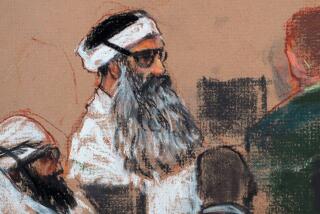A Tough Sell as Death Penalty Case
- Share via
WASHINGTON — It is hard to prove a defendant was a “major participant” in a murder case when he was in jail nearly 1,000 miles away.
That is the essence of U.S. District Judge Leonie M. Brinkema’s ruling Thursday throwing out a possible death penalty against Zacarias Moussaoui, the only suspect in the attacks of Sept. 11 to be charged in U.S. courts.
Brinkema’s opinion highlighted a problem that was apparent in the government’s case from the start: Moussaoui, who appeared to be both a dedicated terrorist and a bumbler, didn’t directly participate in the attacks.
Though he attended Al Qaeda training camps in Afghanistan and apparently aspired to hijack an airliner in the United States, his bizarre behavior led to his arrest in Minnesota more than three weeks before the attacks on the World Trade Center and the Pentagon. Moussaoui had aroused suspicion because he took flying lessons but appeared to have no interest in being a pilot.
After the 19 hijackers died in the four plane crashes, Moussaoui was dubbed “the 20th hijacker,” and Bush administration lawyers sought the death penalty in a federal indictment in Alexandria, Va., in December 2001.
The indictment charged him with crimes including “conspiracy to commit aircraft piracy” and “conspiracy to murder U.S. employees.”
Under the law, conspiracy is a type of guilt by association. Those who agree to join a criminal plot -- to sell cocaine, for example -- can be charged and convicted of conspiracy to deal drugs even if they never saw a gram of cocaine. Joining the criminal plot constitutes the crime of conspiracy.
Prosecutors could show evidence that Moussaoui was indeed a conspirator. He had gone to the Al Qaeda training camps, received wire transfers of $14,000 from an Al Qaeda operative in Germany and enrolled in flight training in Oklahoma.
However, as Judge Brinkema pointed out, proving that a conspirator deserves to die for his crime requires the government to show he was a “major participant” in the actual murder.
During the 1970s, the Supreme Court upheld capital punishment as constitutional, but limited it to murderers and those who are directly involved in a crime that leads to homicide.
“The penalty of death is qualitatively different from a sentence of imprisonment, however long,” and it is reserved for the gravest of crimes, the high court said in the 1976 ruling that was quoted by Brinkema.
In Moussaoui’s case, the government came forward with no evidence that the French-born Muslim was directly involved in the Sept. 11 hijackings. For his part, Moussaoui had agreed to plead guilty to being a member of Al Qaeda, but he denied involvement in the attacks.
In recent months, the government also refused to allow Moussaoui’s lawyers to take a statement from Ramzi Binalshibh and two other Al Qaeda leaders, who were expected to confirm that Moussaoui was not involved. The 6th Amendment says, “In all criminal prosecutions, the accused shall ... have compulsory process for obtaining witnesses in his favor.”
Given the government’s lack of evidence and its refusal to permit testimony from favorable witnesses, Brinkema said she had no choice but to drop the proposed death sentence.
Moussaoui’s conspiracy trial may go forward, however, and if found guilty, he could be sentenced to life in prison, Brinkema concluded.
A former federal prosecutor who has followed the case expects government prosecutors to press forward, but doubts they will win a death sentence.
“The government could have put Moussaoui away for life and done it with ease. He joined the conspiracy and admitted it,” said Stephen A. Saltzburg, a George Washington University law professor. “But being a member of conspiracy is not enough to get you a death sentence. She is saying this is really not a death penalty crime, and I think it will be difficult for them to reverse her on that point.”
More to Read
Sign up for Essential California
The most important California stories and recommendations in your inbox every morning.
You may occasionally receive promotional content from the Los Angeles Times.











